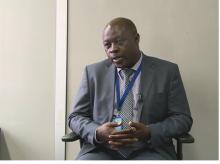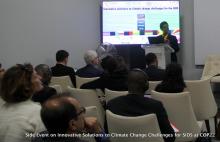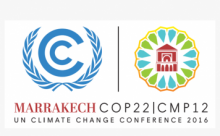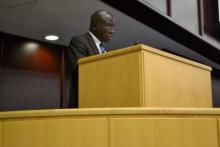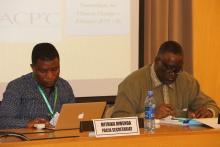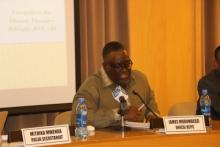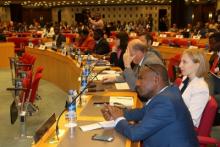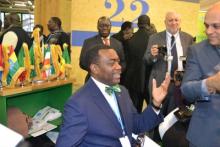In The News
|
Addis Ababa, 01 September 2017 - The Grand Renaissance Dam in which Ethiopia is building along the Nile could be a motivation for African countries in terms of mobilizing domestic resources, an expert from African Climate Policy Center (ACPC) said.
Senior Expert on Energy and Climate Change at ACPC, Linus Mofor said the GERD is a manifestation of well-planned domestic resources mobilization efforts in financing a country’s resources.
|
|
The African Small Island Developing States (SIDS) attracted special attention during the 22nd Conference of the Parties (COP 22) of the United Nations Framework Convention on Climate Change (UNFCCC) in Marrakech, Morocco. Several side events were organized in parallel to the main negotiations, including one on Innovative Solutions to Climate Change Challenges for the SIDS. It was promoted by SYAH Cabo Verde, the African Climate Policy Centre (ACPC) of the United Nations Economic Commission for Africa (UNECA) and the World Meteorological Organization (WMO). It counted with the participation of the Food and Agriculture Organization of the United Nations (FAO) Deputy Director-General and Coordinator for Natural Resources, Ms. Maria Helena Semedo, as a keynote speaker, and the African Union Commissioner of Rural Economy and Agriculture (AUC-REA), Ms. Rhoda Peace Tumusiime, the WMO Secretary General, Prof. Petteri Taalas, and the AMCOMET Chair, Mr. Gilberto Silva, for the welcoming remarks. |
|
Kenya’s single largest private investment in history is the Lake Turkana Wind Power Project (LTWP)—the largest wind farm on the continent. Quantifying the direct and indirect benefits of this project is challenging, but also critical to understanding how low emission development strategies (LEDS) can help countries achieve national development objectives beyond greenhouse gas mitigation—such as energy security, job creation, and improved human health.
USAID’s Global Climate Change Office and its Resources to Advance LEDS Implementation (RALI) Project, implemented by ICF, in partnership with the LEDS Global Partnership (GP), has released a case study analyzing the benefits of LTWP, which provides important lessons for maximizing social, environmental and economic returns for other large wind projects in the region and beyond.
The LTWP, expected to be complete in July 2017, will add 310 MW of wind power capacity to Kenya’s national grid through the installation of 365 turbines, construction of 436 kilometers (km) of transmission lines, and rehabilitation of more than 200 km of existing roads. The project covers a remote area of 162 km2, which is home to a population of roughly 1,000 nomadic pastoralists. |
|
Partners of the Climate Information for Development in Africa initiative (ClimDev-Africa), outlined an ambitious second phase business plan to foster and support climate-sensitive development in Africa.
This was disclosed by the Directorate of Information and Communication of the African Union on Friday in a press release. ClimDev-Africa made the statement at the COP 22 2016 in Marrakesh, Morocco. |
|
ADDIS Ababa, Ethiopia (PAMACC News) - As the sixth session of the Climate Change and Development for Africa (CCDA_CI) came to a close, Justus Kabyemera, Coordinator – ClimDev Africa Special Fund at the African Development Bank called on Africa to resolve the issue of gender and inclusivity for climate change and development sooner than later.
“Of course there are issues that remain to be sorted out, but as most of you highlighted in the course of the discussions, we need to be more strategic and assertive in our decisions. Issues of gender and inclusivity for climate change and development are some of the gaps that we need to resolve sooner than later,” he said. |
|
La sixième Conférence sur les changements climatiques et le développement en Afrique (CCDA-VI), et la toute première sur le continent africain, aura lieu à Addis-Abeba, du 18 au 20 octobre et réunira diverses parties prenantes. L’objectif de la CCDA-VI est de comprendre les implications, les nuances, les défis et opportunités de la mise en en œuvre de l’Accord de Paris.
Source: CCDA-VI: l’Afrique examine des implications de la mise en œuvre de l’Accord de Paris | Climate Reporters |
|
The Africa Climate Policy Centre of the United Nations Economic Commission for Africa has urged African countries that are yet to ratify the Paris Agreement to consider revising their Intended Nationally Determined Contributions (INDCs). Speaking at a civil society workshop on the eve of the sixth Conference on Climate Change and Development in Africa (CCDA VI) in Addis Ababa, Ethiopia, ACPC Officer in Charge, James Murombedzi said an analysis of most INDCs has revealed a number of discrepancies which countries must revisit before they submit their instruments of ratification.
Source: Paris Agreement: African INDCs require revision before ratification – Experts | Climate Reporters |
|
ADDIS ABABA, Ethiopia (PAMACC News) - “The Paris Agreement is somewhat weak in terms of how African countries will attract the required investments to deal with the challenges of climate change…,”says James Murombedzi, Officer in Charge of the Africa Climate Policy Centre of the United Nations economic Commission for Africa (UNECA).
While heralded as a landmark global deal on climate change, there remains a feeling of impotence from the Africa group on certain nuances of the Agreement and its implications to the continent’s development agenda. |
|
ADDIS ABABA, Ethiopia (PAMACC News) - African governments have been urged to ratify and implement the Paris Agreement on climate change to help manage effects of climate change. Speaking at the sixth conference on Climate Change and Development in Africa (CCDA V1) at the UN Complex in Addis Ababa, Ethiopia during the high level session, experts and ministers said the pact is good for the continent. |
|
The African Development Bank, (AfDB) has unveiled a new action plan for 2016-2020 in pursuant to its ambitious vision to accelerate the continent’s economic transformation and the fight against climate change.
“We need to build technical skills so that African economies can realize their full potential for adaptation in high-technology sectors,” said Kapil Kapoor, acting vice president, sector operation at the African Development Bank, during the official opening of the 6th Conference on Climate Change and Development in Africa, CCDA-VI, October 18,2016 in Addis Ababa- Ethiopia. |
